Artificial intelligence as a tool for the detection of tax fraud: The case of Colombia
Main Article Content
Abstract
Article Details

This work is licensed under a Creative Commons Attribution-NonCommercial-NoDerivatives 4.0 International License.
Esta obra está sujeta a la licencia Reconocimiento-NoComercial-SinObraDerivada 4.0 Internacional de Creative
Commons. Para ver una copia de esta licencia, visite http://creativecommons.org/licenses/by-nc-nd/4.0/.
References
Asociacion de Certificadores de Fraude . (2014). ACFE. Obtenido de https://acfe-spain.com/recursos-contra-fraude/que-es-el-fraude
Abdullahi, R., & Mansor, N. (2015). Fraud triangle theory and fraud diamond theory.
Antón, S. (2022). El uso de la inteligencia artificial para optimizar los ingresos tributarios. Obtenido de Scioteca: http://cafscioteca.azurewebsites.net/handle/123456789/1933
Asociación Internacional de Supervisores de Seguros (IAIS). (2021). Global Insurance Market Report. Obtenido de https://www.iaisweb.org/page/gimr2021
Asociación Nacional de Instituciones Financieras. (Mayo de 2018). Lucha contra la evasión-informalidad: factura electrónica y medios de pago. Obtenido de https://anif.co/Biblioteca/politica-fiscal/lucha-contra-la-evasion-informalidad-factura-electronica-y-medios-de-pago
Badal, E. (2018). Combining Benford’s Law and machine learning to detect money laundering. An actual Spanish court case. ELSEVIER. Obtenido de https://doi.org/10.1016/j.forsciint.2017.11.008 DOI: https://doi.org/10.1016/j.forsciint.2017.11.008
Banco Mundial . (2020). Recaudación impositiva . Obtenido de https://datos.bancomundial.org/indicator/GC.TAX.TOTL.GD.ZS?end=2020&start=2004&view=chart
Bayou, M. E., & Reinstein, A. (2001). A systemic view of fraud explaining its strategies, anatomy and process. Critical Perspectives on Accounting. En A systemic view of fraud explaining its strategies, anatomy and process. Critical Perspectives on Accounting (pág. 12). DOI: https://doi.org/10.1006/cpac.2000.0443
Bedoya, E., & Mogollon, E. (2018). Incidencia de la facturación electrónica en la reducción de la evasion fiscal. Manizales.
Borinsky, M. (2013). Fraude Fiscal. Buenos aires: Ediciones Didot.
Cajamarca, I. (04 de 10 de 2021). Más de 580 colombianos han usado paraísos fiscales según los 'Pandora Papers. Obtenido de la republica: https://www.asuntoslegales.com.co/actualidad/mas-de-580-colombianos-han-usado-paraisos-fiscales-segun-investigacion-pandora-papers-3241870
Chamorro , M. (2022). Conozca los tipos de fraude fiscal más comunes. Obtenido de El universal : https://www.eluniversal.com.co/especial/contabilidad/conozca-los-tipos-de-fraude-fiscal-mas-comunes-YJ6193980
Congreso de Colombia. (24 de Julio de 2000). Ley 599 DE 2000 Codigo Penal. Colombia. Obtenido de https://www.oas.org/dil/esp/codigo_penal_colombia.pdf
Congreso de la republica. (13 de Diciembre de 1990). LEY 43 DE 1990. Por la cual se adiciona la Ley 145 de 1960, reglamentaria de la profesión de Contador Público y se dictan otras disposiciones", Art 20. Colombia.
Cubides, J. (2022). Asuntos legales. Obtenido de https://www.asuntoslegales.com.co/analisis/juan-sebastian-cubides-cardona-3360029/inteligencia-artificial-un-contendor-para-la-evasion-fiscal-3360027
Cuellar, J. P. (2022). LR la republica. Obtenido de https://www.larepublica.co/economia/la-evasion-de-impuestos-le-estaria-quitando-a-colombia-cerca-de-80-billones-al-ano-3418446#:~:text=Entre%20los%20tributos%20en%20los,0%2C7%25%20del%20PIB.
DANE. (2020). DANE . Obtenido de https://www.dane.gov.co/index.php/estadisticas-por-tema/cuentas-nacionales/cuentas-nacionales-departamentales
DIAN. (2018). Plan estratégico de tecnologías de información . Obtenido de https://www.dian.gov.co/dian/entidad/PlaneacionDocumentosAnteriores/10.%20Plan%20Estrategico%20de%20Tecnolog%C3%ADas%20de%20la%20informaci%C3%B3n.pdf
DIAN. (2019). DIAN. Obtenido de https://www.dian.gov.co/Prensa/Paginas/BlogDetails.aspx?DianId=21
DIAN. (2019). Facturación Electrónica. Obtenido de https://www.dian.gov.co/dian/entidad/Paginas/Presentacion.aspx.
DIAN. (2021). Plan digital de la DIAN 2021. Obtenido de https://www.dian.gov.co/dian/entidad/PlanEvalInstitucional/10.%20Plan%20Digital%20DIAN%202021.pdf
Donovan, J. (2019). The Value of Offshore Secrets: Evidence from the Panama Papers. Oxford University Press. Retrieved from https://bibliotecadigital.ucc.edu.co/discovery/fulldisplay?docid=cdi_crossref_primary_10_1093_rfs_hhz017&context=PC&vid=57UCC_INST:57UCC_INST&lang=es&search_scope=MyInst_and_CI&adaptor=Primo%20Central&tab=Everything&query=any,contains,PANAMA%20PAPERS&offs
Evans , R. (2020). How AI Is Helping Companies And Governments Fight Tax And Financial Fraud. Forbes. Obtenido de https://www.forbes.com/sites/forbestechcouncil/2020/10/01/how-ai-is-helping-companies-and-governments-fight-tax-and-financial-fraud/?sh=4d4adec81fd4
Faúndez, A. (2022). Use of artificial intelligence by tax administrations: An analysis regarding taxpayers’ rights in Latin American countries. Obtenido de https://doi.org/10.1016/j.clsr.2020.105441 DOI: https://doi.org/10.1016/j.clsr.2020.105441
Federacion Nacional de Contadores . (NIA 240). Normas Internacionales de Auditoría.
Garcia, C. (2020). Centro interamericano de administración tributaria. Obtenido de Centro interamericano de administración tributaria: https://www.ciat.org/el-uso-de-la-inteligencia-artificial-por-las-administraciones-fiscales-una-cuestion-de-principios/#:~:text=Por%20otra%20parte%2C%20en%20la,en%20los%20supuestos%20de%20mayor
Garcia, C., & Herrera, B. (2020). Centro Interamericano de Administraciones Tributarias. Obtenido de https://www.ciat.org/el-uso-de-la-inteligencia-artificial-por-las-administraciones-fiscales-una-cuestion-de-principios/
Gobierno Nacional De Colombia . (1971). Decreto 410 de 1971. En Codigo de comercio de Colombia (pág. ART 207).
Gomez, J. C., & Moran, D. (2020). Estrategias para abordar la evasión tributaria en America latina y el caribe . CEPAL.
Gonzalez, G. (02 de 04 de 2020). Investigación documental: características, estructura, etapas, tipos, ejemplos. Obtenido de Lifider: https://www.lifeder.com/investigacion-documental/
Gunduz, S., Arslan, B., & Demirci, M. (2015). A Review of Machine Learning Solutions to Denial-of-Services Attacks in Wireless Sensor Networks IEEE. 14th International Conference on Machine Learning and Applications (ICMLA), Miami,, 150-155. doi: 10.1109/ICMLA.2015.202. DOI: https://doi.org/10.1109/ICMLA.2015.202
Guzmán, V. E. (2017). Docplayer. Obtenido de https://docplayer.es/51414973-Aranda-query-manager-v-9-0-manual-de-instalacion-y-uso.html
Hechmi, J. M., Khlaifi, H., Bouatay, A., & Zrelli , A. (2018). Intrusion Detection Using Data Fusion and Machine Learning. 26th International Conference on Software, Telecommunications and Computer Networks (SoftCOM), Split,, 1-6. doi:10.23919/SOFTCOM.2018.8555800. DOI: https://doi.org/10.23919/SOFTCOM.2018.8555800
Knaus, C. (2019). Tax office uses AI to target dodgy returns in real time. The Guardian. Obtenido de https://www.theguardian.com/australia-news/2019/feb/14/tax-office-uses-ai-to-target-dodgy-returns-in-real-time
Kumar, D. P., Amgoth, T., & Annavarapu, C. R. (2019). Machine learning algorithms for wireless sensor networks: A survey. Information Fusion, 49, 1-25. https://doi.org/10.1016/j.inffus.2018.09.013. DOI: https://doi.org/10.1016/j.inffus.2018.09.013
Lopez, J. (2019). Uso de técnicas de machine learning para la detección de fraudes en los contratos de obras publicas . Chile: CONCURSO OLACEFS 2019.
McKinsey Global Institute. (2019). Notes from the AI frontier: Insights from hundreds of use cases. Obtenido de https://www.mckinsey.com/featured-insights/artificial-intelligence/notes-from-the-ai-frontier-insights-from-hundreds-of-use-cases
OCDE . (2022). OCDE. Obtenido de PROYECCION MUNDIAL : https://www.oecd.org/acerca/miembros-y-socios/
Organizacion para la Cooperacion y el Desarrollo Económico. (2022). OCDE. Obtenido de https://www.oecd.org/acerca/miembros-y-socios/
Palacio, C. (2019). Análisis de la implementación de la factura electrónica en Colombia como mecanismo de control al fraude fiscal.
Prajapati, J., & Jain, S. C. (2018). Machine Learning Techniques and Challenges in Wireless Sensor Networks. Second International Conference on Inventive Communication and Computational Technologies (ICICCT), Coimbatore, 2018, 233-238. doi: 10.1109/ICICCT.2018.8473187. DOI: https://doi.org/10.1109/ICICCT.2018.8473187
Quiroz, S., & Osman, J. (2021). La cultura del fraude y su incidencia en el trabajo del Revisor Fiscal en Colombia.
Rodriguez, E. (2018). Analisis y detección de fraude fiscal mediante tecnicas de aprendizaje automatico. Universidad Pontificia de Madrid .
Rouse, M. (30 de 04 de 2017). Inteligencia artificial, o AI. (TechTarget, S.A de C.V 2005 - 2019) Recuperado el 31 de 05 de 2019, de https://searchdatacenter.techtarget.com/es/definicion/Inteligencia-artificial-o-AI
Ruiz, L. (2016). Utilización de herramientas estratégicas para la detección del fraude fiscal. Revista ICU . Obtenido de http://repositorio.umaza.edu.ar/handle/00261/828 DOI: https://doi.org/10.59872/icu.v1i1.10
Ruiz., M. G. (2016). La educación fiscal como herramienta de prevención del fraude fiscal.
Savić, M. (2022). Gestión del riesgo de evasión fiscal mediante un método híbrido no supervisado de detección de valores atípicos. Obtenido de https://bbibliograficas.ucc.edu.co:2152/science/article/pii/S0957417421016973#bb4
Serrano , F. (2021). Banco de desarrollo de america latina. Obtenido de https://www.caf.com/es/conocimiento/visiones/2021/09/sera-la-inteligencia-artificial-la-autentica-revolucion-de-las-administraciones-tributarias-30/
Smithers, R. (2020). Taxman uses artificial intelligence to beat fraudsters. The Guardian. Obtenido de https://www.theguardian.com/business/2020/oct/14/taxman-uses-artificial-intelligence-to-beat-fraudsters

